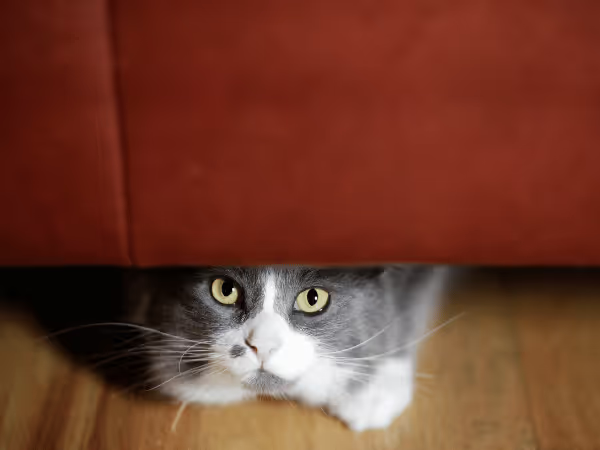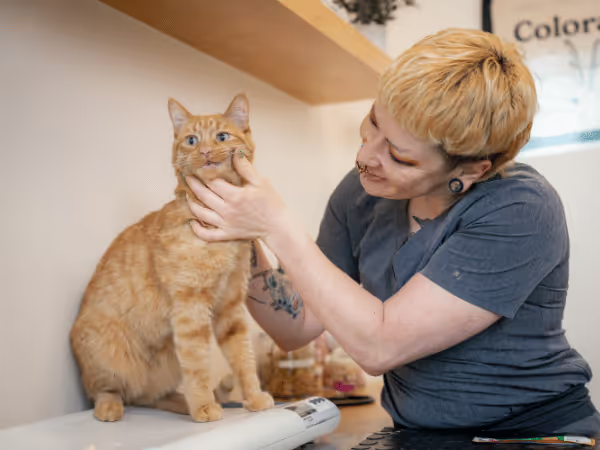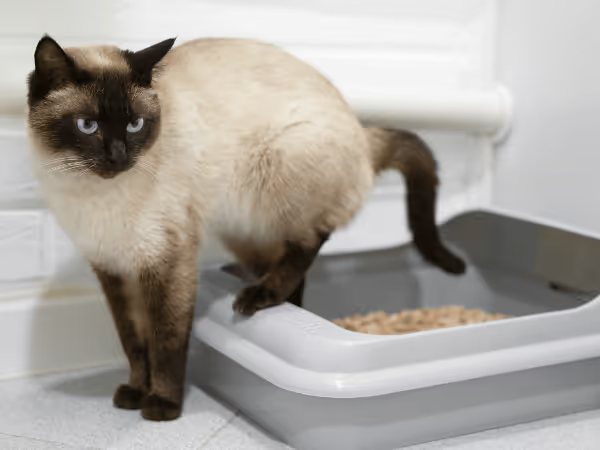Constipation in cats is a common issue and can cause considerable cat pain and discomfort. If left untreated, this issue can lead to more serious health problems. Understanding the signs of constipation in cats and knowing how to respond effectively can help your feline friend stay healthy and happy.
9 Common Signs of Constipation in Cats
Cats don’t always show overt signs of constipation. This is why it’s important for pet parents to closely monitor subtle shifts in their behavior. Some of the most common signs of constipation in cats include:
- Infrequent or absent bowel movements – Check your cat’s litter box. If they have less than one stool every 24–48 hours, it could be a sign of constipation.
- Straining in the litter box – Cats may spend excessive time trying to defecate if they are experiencing constipation.
- Hard, dry, or pebble-like stools – Look at the consistency of your cat’s poop; if it’s hard or dry, it can be due to constipation and dehydration.
- Pooping outside of the litter box – When cats have constipation, they may feel urgency or discomfort when they defecate, potentially leading to accidents outside of the litter box.
- Excessive meowing, vocalizing or crying – When they do this, it could be a sign of pain or frustration, especially when they do it in their litter box or close to it
- Loss of appetite – A full colon, due to constipation in cats, can reduce hunger.
- Lethargy or hiding behavior – Constipated cats may avoid interaction or playtime due to discomfort
- Vomiting in cats – This can occur as a result of prolonged straining or gastrointestinal upset.
- Abdominal bloating – When a cat is constipated, their belly may feel firm or distended. This may need urgent veterinary attention.
Note: Noticing any of the above signs? If so, it may be time to call for urgent vet care. Sploot Vets is a provider of urgent and emergency vet services in Chicago, Denver, & Colorado Springs. We offer unparalleled availability with extended clinic hours (8 AM to 8 PM). Call us for next steps→

Causes of Constipation in Cats
There are several reasons a cat might become constipated; here are some of the most common ones:
- Dehydration in cats – This can be due to warm weather, lack of fresh water, dry-food-only diets, or kidney disease.
- Hair ingestion – Frequent grooming can lead to hair accumulation in the intestines. This can cause or aggravate constipation in cats.
- Obesity and lack of activity – A lack of movement can slow intestinal motility. It may be time to switch to weight control cat food.
- Orthopedic pain – Arthritis or injuries may make it painful to use the litterbox.
- Dietary issues – Low-fiber or highly processed diets can lead to constipation/
- Foreign bodies or blockages – Ingested objects and other intestinal blockages can physically obstruct the bowel.
How to Treat Constipation in Cats
Looking for a remedy for constipation in cats? While some of the following remedies can be done at home, we always recommend consulting a trusted veterinarian. This is because constipation in cats can be due to various reasons, including more serious ones like foreign body ingestion.
Note: For your cat’s safety, call an urgent care veterinarian if constipation is prolonged or accompanied by symptoms like excessive meowing or severe discomfort.
1. Boost Hydration
In many cases, constipation in cats is caused by poor hydration. Therefore, vets may advise you to provide fresh, clean water for your cat. Additionally, some cats prefer to drink running water. Using a cat water fountain may help entice your cat to drink.
In case your cat is suffering from moderate to severe dehydration, a veterinarian may ask you to drop by so they can administer subcutaneous fluids or IV fluids to quickly restore your cat’s hydration and electrolyte balance.
2. Dietary Changes
Some dietary tweaks may help prevent constipation in cats. Veterinarians may recommend switching to wet cat food or opting for mixed feeding (combining wet and dry cat food) to help boost your cat’s hydration and soften their stools.
In addition, a high-fiber diet with probiotics may also promote regular bowel movements, especially in senior cats. Lastly, if excess weight and inactivity is contributing to your cat’s constipation, the vet may recommend weight loss cat food.
3. Laxatives and Stool Softeners
While laxatives and stool softeners for cats can help improve your cat’s bowel movement, we recommend only using these under the guidance of a trusted veterinarian. In addition, AVOID using laxatives for humans as they can be toxic to your cat.
4. Enemas
In some cases, a veterinarian may recommend an enema for cats. This is typically done when quick relief is needed for prolonged constipation with impacted feces. This must be STRICTLY done under veterinary supervision to avoid injury and toxicity.
5. Addressing Underlying Causes
In some cases, constipation is NOT due to dehydration, diet, or simple intestinal issues. Constipation in cats can also be due to pain, intestinal blockages, or foreign body ingestion. For these underlying causes, here are the most common treatments:
- Pain relief – If arthritis or injury is contributing, pain medications or joint supplements for cats may help.
- Intestinal blockage or foreign body removal surgery – This is a type of life-saving veterinary surgery to remove obstructions (e.g., tumors, foreign bodies, or intestinal twists that impair normal digestion.

When to Seek Urgent Vet Care for Constipation in Cats
If your cat hasn’t pooped in 24 hours, it’s a good idea to call your veterinarian. They may ask a few questions and either recommend monitoring your cat at home with specific instructions or advise a visit.
However, if your cat hasn’t passed stool in 48 hours, this requires urgent veterinary care. Additionally, watch for these signs, which also indicate the need for immediate vet care:
- Shows signs of significant discomfort or distress
- Vomits repeatedly
- Blood in the stool
- Appears lethargic or has a bloated abdomen
Sploot Vets: Urgent Care & Emergency Vet Services for Cats
Need an urgent or emergency vet visit? Sploot Veterinary Care is here for you, with availability 365 days a year for extended hours (8 AM to 8 PM).
Our vet clinics in Chicago, Denver, and Colorado Springs offer next-level, all-in-one vet care, encompassing primary care, urgent care, and emergency vet services.
Get top-tier care for your cat from our experienced vets and modern vet clinics, complete with spacious exam rooms, in-house diagnostics, and dedicated surgical suites. We handle more than 95% of your pet’s healthcare needs, with rates up to 60% lower than those of 24/7 vet ERs.
Easily arrange an urgent care or emergency vet appointment at Sploot by calling us at (720) 770-8656.






